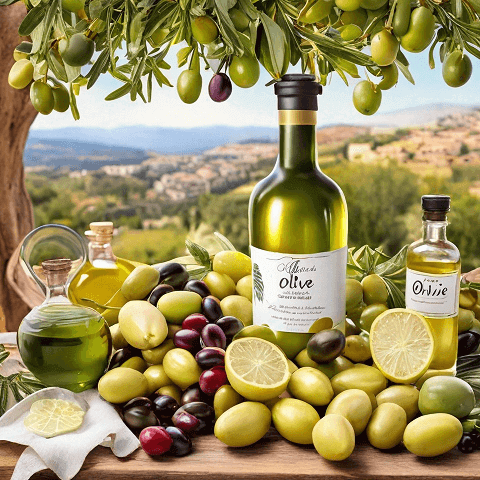Extra virgin olive oil (EVOO) is not just a kitchen staple; it's a veritable elixir of health, celebrated for its remarkable benefits and rich history. Revered since ancient times, EVOO is a cornerstone of the Mediterranean diet, lauded for its capacity to enhance well-being and elevate culinary creations. In this blog, we'll delve into the myriad health benefits of extra virgin olive oil, explore the best regions and soils for olive cultivation, and provide tips on incorporating this liquid gold into your daily routine.
The Health Benefits of Extra Virgin Olive Oil
1. Cardiovascular Health:
EVOO is rich in monounsaturated fats, particularly oleic acid, which is known to reduce inflammation. The oil is also high in antioxidants, such as polyphenols, which protect the heart by reducing oxidative stress. Studies have shown that regular consumption of EVOO can lower the risk of heart disease, decrease blood pressure, and improve cholesterol levels.
2. Joint Health:
The anti-inflammatory properties of EVOO can help alleviate symptoms of rheumatoid arthritis. Its consumption has been linked to reduced pain and improved joint function, thanks to its high content of oleocanthal, a compound with similar effects to non-steroidal anti-inflammatory drugs (NSAIDs).
3. Antioxidant Powerhouse:
EVOO is packed with antioxidants, including vitamin E and phenolic compounds, which combat free radicals in the body. These antioxidants can reduce the risk of chronic diseases and slow down the ageing process.
4. Weight Management:
Incorporating EVOO into your diet can aid in weight management. Its healthy fats promote satiety, reducing the likelihood of overeating. Unlike other fats, EVOO has been shown to have positive effects on metabolism.
5. Digestive Health:
EVOO has a protective effect on the digestive system. It can help prevent ulcers and reduce the risk of gallstones. Its mild laxative effect can also aid in maintaining regular bowel movements.
The Best Regions for Olive Cultivation
For the finest extra virgin olive oil, the terroir—or the combination of soil, climate, and landscape—is crucial. Some regions are particularly renowned for their superior olive oil production:
1. Sicily, Italy:
Sicily is a standout region, producing some of the world's best olive oils. The island's unique microclimates and volcanic soils, particularly around Mount Etna, create optimal conditions for olive cultivation. The producer Planeta, a family-owned estate, is celebrated for its exceptional EVOO, which embodies the rich, complex flavours of Sicilian olives.
2. Andalusia, Spain:
Andalusia is the largest olive oil-producing region in the world, known for its vast olive groves and diverse varieties. The region's hot, dry climate and limestone-rich soils contribute to the distinctive taste and quality of its oils.
3. Kalamata, Greece:
The Kalamata region is famous for its eponymous olives, which produce a robust and fruity oil. The combination of mountainous terrain and coastal breezes creates an ideal environment for olive trees to thrive.
Ideal Soils for Olive Cultivation
Olive trees are hardy and adaptable, but they produce the best fruit in specific soil types:
1. Volcanic Soils:
Rich in minerals and well-draining, volcanic soils, like those found in Sicily, are perfect for olive trees. These soils impart a unique, complex flavour to the oil.
2. Limestone Soils:
Calcareous soils, common in Andalusia, are excellent for olive trees. They provide good drainage and the right pH balance, enhancing the quality of the olives.
3. Sandy Loam Soils:
Sandy loam, a mix of sand, silt, and clay, offers good drainage and aeration. It's prevalent in many top olive-growing regions and supports healthy root development.
Tips for Using Extra Virgin Olive Oil
Incorporating EVOO into your diet is easy and delicious. Here are some tips to maximise its benefits:
1. Cooking:
Use EVOO for sautéing vegetables, frying eggs, or as a base for marinades. Its high smoke point makes it versatile for various cooking methods.
2. Dressings and Drizzles:
Enhance salads, pasta, and grilled vegetables with a drizzle of EVOO. Its rich flavour pairs well with herbs and spices.
3. Baking:
Replace butter or other oils with EVOO in baking recipes for a healthier alternative. It works well in cakes, muffins, and bread.
4. Dips and Spreads:
Create a simple yet delicious dip by mixing EVOO with balsamic vinegar, herbs, and a pinch of salt.
5. Daily Consumption:
For a health boost, take a tablespoon of EVOO on an empty stomach each morning.
Conclusion
Extra virgin olive oil is more than just a culinary delight; it is a powerful ally in promoting health and longevity. Its wealth of monounsaturated fats, antioxidants, and anti-inflammatory properties make it a cornerstone of a heart-healthy diet and a natural remedy for various ailments. By choosing EVOO from renowned regions like Sicily, Andalusia, and Kalamata, and understanding the significance of optimal soils such as volcanic and limestone-rich, you can ensure you're getting the highest quality oil.
Incorporating this liquid gold into your daily routine can be as simple as a morning tablespoon or as creative as using it in your favourite recipes. Whether you are sautéing, drizzling, baking, or dipping, extra virgin olive oil can enhance the flavour of your dishes while providing numerous health benefits.
Producers like Planeta in Sicily exemplify the dedication and expertise required to cultivate and produce exceptional olive oil. Their commitment to quality and tradition is evident in every drop, making their EVOO a must-try for anyone serious about both flavour and health.
So, next time you reach for cooking oil, remember the myriad benefits of extra virgin olive oil. It’s not just a cooking ingredient—it’s a path to a healthier, more vibrant life. Embrace the rich heritage and health benefits of EVOO and let it transform your kitchen and well-being.


